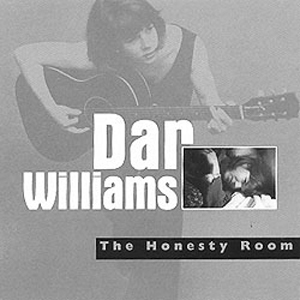![[Metroactive Music]](/gifs/music468.gif)
[ Music Index | Santa Cruz | Metroactive Home | Archives ]
'The Honesty Room' (1993)
Several years and albums later, Dar Williams takes a look back to offer up her own assessment of the early work that got her where she is today
"I listen to 'The Honesty Room' now and I say, 'Who is this child?' I mean, I recorded it 10 years ago, but even three years later I couldn't recognize my voice, because I'd done so many gigs since it was released. So I hear it more in my voice. I think the songs actually hold up, because I wrote that album in a very heartbroken year. I write about six songs a year, which actually is a lot. Everyone's different, but it's so painstaking. And I think when I was lonely and kind of going in with my pen and trying again to work and rework a sentence and I was so heartbroken and I didn't have a lot of friends in this new town, I learned that that's what it takes. It takes that kind of effort, and the good news is that those turned out to be songs that I can hold on to. I'll take out a little B-side song from 'The Honesty Room' every once in a while and play it and not shudder. Whereas I put out two tapes before 'The Honesty Room' and I have absolutely no desire to play any of those songs again."
"'Mortal City' has definitely got the most requested songs. It has sold the best. It is for some reason the squirrel-hole of favorites--it's got 'The Christians and the Pagans' and 'Iowa' and 'February' and 'The Ocean,' and even the song about the potheads. I was always in pursuit from album one to album two of a better positioning of the vocals. That's all I really cared about, I kind of felt like everything else was just doing its thing in its own time. When you walk into the studio, you don't just walk in with an idea of how it sounds in its perfect state. You walk in automatically in a relationship with other people, you walk in thinking about your troubles, your worries, your hopes and what you ate for breakfast that morning. It's all in there. So whatever happened to me in 1993 as I walked into the studio came into the studio with me, and that's the archive of that day for all of us in that studio. I'm glad to have seen more and more production elements, where I have a better grip on how to talk about them and position them."
End of the Summer (1997)
"I find 'End of the Summer' to be very produced. When people say that this ['The Beauty of the Rain'] is produced, I'm like, 'We've been having this discussion for a while.' When people come up to me to sign 'End of the Summer,' I'm always so happy. That has definitely sold the least of the albums; it was sort of my B side. But there are people who need something a little different from an artist, and they don't respond to the popular stuff, but they do respond to something that's a deeper strain for that artist, something that was a little off the beaten path for that artist. I think that was definitely End of the Summer--it was written over a period of time that was definitely like no other in my life. I was so unaware of the effects that my career was having on me, that the business and the traveling were having on me. I was so full-time. It wasn't that the rug was pulled out from under me, it was like the rug started to fly out the window. It was a wonderful magic carpet ride, it still is. But I'm used to it now, I understand that you have to build intimacy even in a traveling life, and you make a lot of mistakes, and you're not quite like your friends, but you are more like them than they believe."
--As told to Steve Palopoli
[ Santa Cruz | Metroactive Central | Archives ]
Copyright © Metro Publishing Inc. Maintained by Boulevards New Media.
Buy one of the following Dar Williams CDs from amazon.com: ![]()
If I Wrote You

The Honesty Room (1993)

Mortal City (1996)
From the May 7-14, 2003 issue of Metro Santa Cruz.